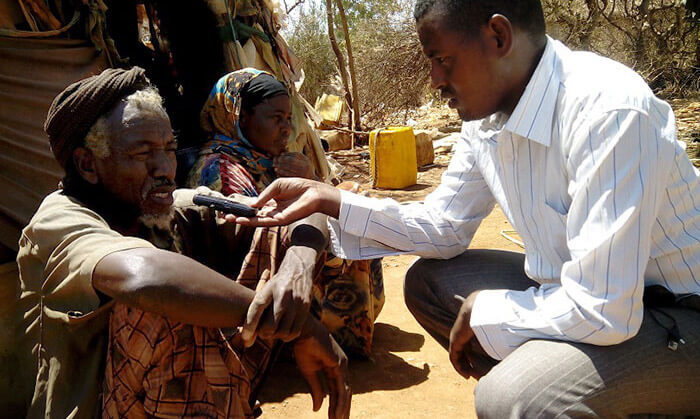On the frontlines of Freedom of Expression: Radio Ergo

A Radio Ergo reporter speaks with a member of a small Somali community. Radio Ergo is Somalia’s only dedicated humanitarian radio service, linking vulnerable communities with humanitarian actors. Photo: Radio Ergo
Radio Ergo, with support from IMS, provides the Somali population with valuable, life-saving information through programming on issues such as health and HIV/AIDS, education, conflict prevention, and gender equality. Their programmes enable the Somali listeners to make better-informed decisions in their communities and for their families.
One of Ergo’s key roles is to bridge a communication gap between Somalis and relief agencies, enabling humanitarian workers to better design their aid interventions.
“Over the years the radio service has achieved a reputation of independence,” says Louise Tunbridge, Programme Manager at Radio Ergo. “We are apolitical, and people trust us. Our service has a reputation of credibility, balance and fairness in a very difficult context.”
Through its unique presence across the country with a network of local stringers, the radio has become an indispensable source of vital humanitarian information for both the Somali population as well as international relief agencies.
From homeless to homeowners
Mohamud Mohamed Abdi and his wife were living in a tiny shack with their seven children in Baidoa in southern Somalia. Disabled through illness, the couple was earning a pitiful existence by sitting in the hot sun breaking rocks into smaller stones for construction. After Radio Ergo aired their story, a group of young people began to raise money to help them.
“The story made us feel sad and we couldn’t ignore their suffering,” said Ibrahim Ahmed Ibrahim, one of the young people who contributed funds.
“What we found was that the family lived in an overcrowded, small, makeshift room and some family members often slept outside,” Ibrahim told Radio Ergo’s local reporter. “We then contacted local businesses in the community to raise funds and get support.”
The youth group managed to raise almost USD 3,000, and spent it on building a new house with two rooms, a kitchen, and a toilet. Abdi and his family were clearly overwhelmed: “We are very grateful to the youths. They have transformed our lives from being homeless to homeowners.”
With its studio in Nairobi, Radio Ergo transmits daily on shortwave and is also rebroadcast on 18 FM stations inside Somalia. Ergo’s broadcasts reach every part of the country and beyond.
“Our programmes aim to improve the resilience of Somalis who are at risk of the country’s ongoing humanitarian crisis,” says Louise Tunbridge. But direct input from listeners has prompted Ergo’s production staff in Nairobi to cater to new programming needs as well. This means a shift in focus from predominantly humanitarian areas, to the emerging needs of a population experiencing the slow but steady progress Somalia is undergoing, she says.
“We’re moving towards programming aimed at inspiring and encouraging communities to protect themselves and improve their situations.”




